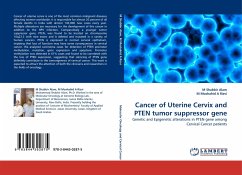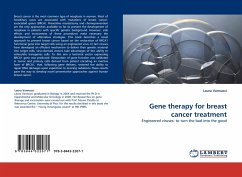
Cancer of Uterine Cervix and PTEN tumor suppressor gene
Genetic and Epigenetic alterations in PTEN gene among Cervical Cancer patients
Versandkostenfrei!
Versandfertig in 6-10 Tagen
39,99 €
inkl. MwSt.

PAYBACK Punkte
20 °P sammeln!
Cancer of uterine cervix is one of the most common malignant diseases affecting women worldwide. It is responsible for almost 20 percent of all female deaths in India with almost 130,000 new cases every year. Multiple alterations are necessary for the development of this cancer in addition to the HPV infection. Comparatively a younger tumor suppressor gene, PTEN, was found to be located on chromosome 10q23.3 with nine exons and is deleted and mutated in a variety of human cancers. PTEN is expressed in normal cervical epithelium, implying that loss of function may have some consequences in cerv...
Cancer of uterine cervix is one of the most common malignant diseases affecting women worldwide. It is responsible for almost 20 percent of all female deaths in India with almost 130,000 new cases every year. Multiple alterations are necessary for the development of this cancer in addition to the HPV infection. Comparatively a younger tumor suppressor gene, PTEN, was found to be located on chromosome 10q23.3 with nine exons and is deleted and mutated in a variety of human cancers. PTEN is expressed in normal cervical epithelium, implying that loss of function may have some consequences in cervical cancer. We analyzed carcinoma cases for detection of PTEN promoter methylation, mutation, gene expression and apoptosis. Promoter methylation was detected in 61% cases and found to be correlated with the loss of PTEN expression, suggesting that silencing of PTEN gene definitely contribute in the tumorigenesis of cervical cancer. This work is expected to attract the attention of both theclinicians and researchers in the fields of oncology.












